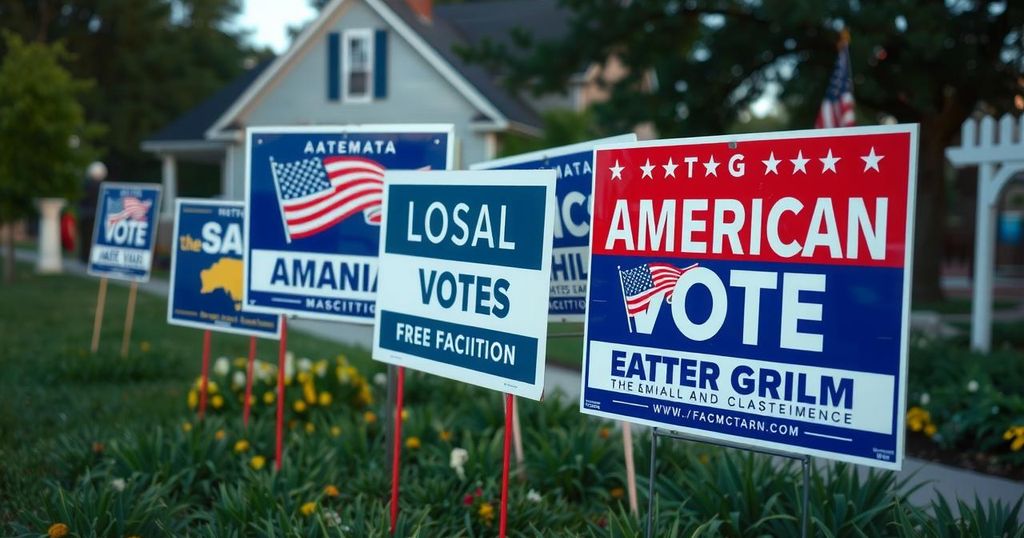Through My Lens: The Significance of Yard Signs in American Elections
The author, a newcomer to America, explores the vibrant culture of election yard signs in Maine, reflecting on their significance in political expression. The narrative contrasts this practice with experiences from other countries, emphasizing the accessibility of civic engagement in the U.S. Ultimately, the author conveys their journey from an observer to an active participant in the democratic process, highlighting the personal significance of a yard sign as a symbol of identity and involvement.
As a newcomer to the United States, specifically Maine, I have experienced much about the electoral season that has both surprised and captivated me. Having participated in my second presidential election, I am struck by how distinct it is from elections I have observed elsewhere. My initial voting experience in 2020, during the contest between Donald Trump and Joe Biden, was filled with both stress and exhilaration. With another election approaching, I once again find myself navigating the anxiety over the outcomes while simultaneously relishing the opportunity to cast my vote. A particularly striking aspect of American electoral culture is the prevalence of yard signs. Those familiar with Maine can hardly overlook these signs dotting neighborhoods and rural thoroughfares. They appear in abundance, akin to spring blooms marking the arrival of election season. For me, these signs serve as an accessible medium to learn about local candidates vying for positions ranging from school boards to Congress. Moreover, they offer intriguing insights into the political affiliations of my neighbors, as many exhibit signs for their preferred presidential candidates or political parties. This year, I have engaged with this American tradition by displaying a Harris-Walz sign in my yard, while my neighbors proudly showcase their Trump-Vance sign. Countless drives around my community have transformed into a delightful game of sign counting. This practice provides a subtle yet impactful method for individuals to demonstrate their political viewpoints. Reflecting on my previous experiences in Nairobi, Kenya during their presidential elections, I recall the absence of similar yard signs. Instead, there were towering billboards and banners featuring the faces of candidates, overtly displayed in public areas and on transportation systems. While those images projected professionalism, they notably lacked the personal touch that American yard signs embody. Here, yard signs serve as an extension of an individual’s identity, visually proclaiming, “I believe in this candidate, and I want you to know.” The informality and accessibility of this tradition within the United States emphasizes that expressing one’s opinion does not require affiliation with a political elite. A humble yard sign can convey a message as powerfully as a large campaign rally. This underscores a crucial tenet of American democracy: every voice is valued, and impactful statements can be made without substantial wealth or influence. For me, these signs transcend their roles as mere political advertisements. Instead, they symbolize the essence of democracy—a tangible reminder of the rights I have diligently fought to secure. In numerous regions across the globe, elections may evoke fear and conflict; however, in the United States, despite electoral stress and anxiety, there exists an undeniable sense of freedom, empowerment, and pride. I now participate in a system that not only permits me to vote but also allows me to express my viewpoint through something as simple as a sign in my yard. Although election seasons in the United States are often prolonged and intense, the accompanying excitement, anticipation, and occasional stress represent a distinctly American experience. This culture encourages public engagement, dialogue, and spirited debate. It is both fascinating and reassuring to observe a nation that fosters such visible civic involvement. As I approach my second presidential election, I carry forward the lessons gleaned from my inaugural experience: patience, hope, and the understanding that my vote indeed holds significance. The yard sign adorning my front lawn may appear inconsequential, yet it embodies my transformation—from an immigrant observing from the periphery to a fully engaged participant in the democratic process. This journey is, without question, a remarkable milestone.
The article reflects on the author’s experience as a newcomer to the United States, particularly in Maine, during the presidential election season. It highlights the distinctive cultural practice of displaying yard signs as a means of political expression, contrasting it with electoral practices in other countries, such as Kenya. The narrative emphasizes the accessibility and personal nature of yard signs in American politics, illustrating how they empower citizens to engage in the democratic process openly and informally. The author’s experiences underscore themes of participation, identity, and pride within the democratic framework of the United States, particularly as a new citizen.
In summary, the narrative illustrates the unique cultural phenomenon of yard signs in American elections, showcasing how they serve as a medium for political expression and personal identity. The author reflects on the significance of this practice in fostering civic engagement and participation, particularly for newcomers who have worked hard to earn their rights within the democratic process. As the author prepares for their second presidential election, the yard sign in their yard stands as a powerful symbol of their journey from an outsider to an active participant in democracy, encapsulating the essence of what it means to engage in voting and political discourse in America.
Original Source: www.pressherald.com




Post Comment